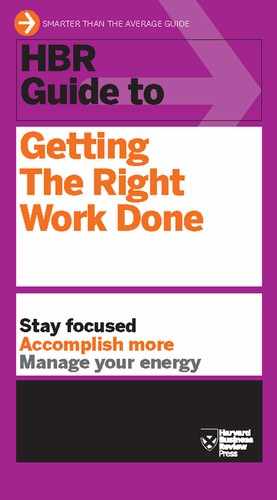Chapter 5
The Worth-Your-Time Test
by Peter Bregman
Nate Eisman recently started working for a large consulting firm after many years as an independent consultant. (Some details changed to protect privacy.) He called me for some advice.
“I’m wasting a tremendous amount of time,” he complained. “I’m in meetings all day. The only way I can get any real work done is by coming in super early and staying super late.”
Nate had gone from an organization of one to an organization of several thousand and was drowning in the time suck of collaboration. He is not alone.
Working with people takes time. And different people have different priorities. Someone may need your perspective on an issue that’s critical to him but not to you. Still, if he’s a colleague, it’s important to help. And often, we want to help.
On the other hand, we’ve all felt Nate’s pain: How can we spend time where we add the most value and let go of the rest?
We need a way to quickly and confidently identify and reduce our extraneous commitments, to know for sure whether we need to deal with something or delegate it, and to manage our desire to be available to others. I propose a brief test that every commitment should pass before you agree to it. When someone comes to you with a request, ask yourself:
- Am I the right person?
- Is this the right time?
- Do I have enough information?
If the request fails the test—if the answer to any one of these questions is “no”—then don’t do it. Pass it to someone else (the right person), schedule it for another time (the right time), or wait until you have the information you need (either you or someone else needs to get it).
Sometimes it’s impossible or inappropriate to wall yourself off completely. For example, what if your boss is the person who interrupts you? Or what if you’re on vacation and an important client reaches out with a time-sensitive and crucial question?
The three test questions offer a clear, easy, and consistent way of knowing how to respond—and help us avoid the tendency to say yes to everything.
If your boss asks you to do something and her request fails the test, it’s not just okay, it’s useful to push back on or redirect her so the work is completed productively. It’s not helpful to you, your boss, or your organization if you waste your time on the wrong work.
That’s the irony. We try to be available because we want to be helpful. And yet being overwhelmed with tasks—especially those we consider to be a waste of our time—is exactly what will make us unhelpful.
When we get a meeting request that doesn’t pass the test, we should decline it. When we’re cc’d on an e-mail that doesn’t require our attention, we need to delete it. And a 50-page presentation needs to pass the test before we read it—and even then, it’s worth an e-mail asking which are the critical pages to review.
A few weeks after sharing the three questions with Nate, I called him at his office at around 6 PM to see how it was going. I guess it was going well, because I never reached him. He had already gone home.
____________
Peter Bregman is a strategic adviser to CEOs and their leadership teams. His latest book is 18 Minutes: Find Your Focus, Master Distraction, and Get the Right Things Done.
______________
Adapted from content posted on hbr.org on April 1, 2010.
